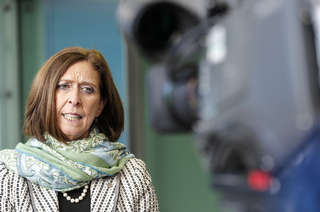 EU Health Ministers will assemble in Luxembourg on 24 and 25 September 2015 for an informal meeting devoted to dementia, the refugee crisis and the impact of the cross-border healthcare directive.
EU Health Ministers will assemble in Luxembourg on 24 and 25 September 2015 for an informal meeting devoted to dementia, the refugee crisis and the impact of the cross-border healthcare directive.
The Luxembourg Health Minister, Lydia Mutsch, who is chairing the meeting, emphasised that dementia is one of the health priorities of the Luxembourg Presidency of the Council of the European Union. "We really insisted on putting the subject on our Presidency agenda, because 47 million people are affected worldwide, including 6 million in Europe", she said upon her arrival at the meeting, pointing out that these numbers will probably increase over the coming years to reach 9 million within the EU by 2030.
The informal meeting will be devoted to discussions on dementia, dealing with secondary prevention and post-diagnostic support, considered in the light of some examples of good practices. Improved access to the relevant information is required, since most Member States find it difficult to pool the existing knowledge in this field.
Ministers will discuss the following issues:
- Is dementia a public health priority in your country and, if so, by what measures is it addressed?
- How can prevention, timely diagnosis and post-diagnostic support contribute to the reduction of the burden of dementia?
- How can EU-level cooperation facilitate the sharing of good practices, and how can it help countries to implement national dementia strategies?
- Is there added value to discuss an EU strategy on dementia, and which aspects should be covered?
During the meeting, the Luxembourg Presidency will unveil its multidimensional secondary prevention programme (pdp) to the EU Member States. The programme was launched in Luxembourg in June 2015, following the adoption of an action plan on dementia in 2013. The overall aim of this programme is to provide post-diagnostic support for people suffering from vascular dementia or Alzheimer's disease in its early stages. Its objective is to pursue a patient-centred and patient-driven approach, providing better support and talking to patients about symptoms. Its goal is to maintain the quality of life by preventing the onset or delaying the progression of the disease and to enable people to stay in their home environment as long as possible.
"We need to reflect on a multi-sectoral approach", stated the Minister, who said she "was proud that prevention programmes had been developed in Luxembourg which aim to prevent the onset or delay the progression of the disease". Lydia Mutsch said the Presidency's goal at the meeting was "to talk about dementia" in Member States, guarantee opportunities for early diagnosis and to ensure that patients, sometimes young people, receive the appropriate treatment. The Minister also underlined the importance of secondary prevention for the early diagnosis of diseases that have not been prevented by primary prevention.
Furthermore, she welcomed the fact that several Member States, including Luxembourg, had adopted dementia prevention programmes. In this regard, "Luxembourg started relatively early and it is a major feature of our national policy", she said, adding that the discussions would focus in particular on the exchange of best practices between countries within this context. The Minister was also pleased that the Dutch Presidency, which will follow the Luxembourg Presidency, had decided to take up this issue and to build on the work carried out in the Grand Duchy. "Against the backdrop of the international discussions on dementia, it would be very wise to enable Member States to learn from the experience and good practices of their colleagues", she concluded.
A group of governmental experts on dementia, set up in February 2014, is seeking to further promote the exchange of good practices at European level. In the same year, the Italian Presidency called upon Member States to continue addressing dementia as a core issue in their policies. In the Council conclusions on public health strategies, the French Presidency had also asked the European Commission to develop a health strategy in order to combat the neurodegenerative diseases associated with ageing and in particular Alzheimer's disease.
In 2009, the Commission adopted a communication which emphasised the need for prevention, early diagnosis and improving epidemiological knowledge and coordination of research. A total of 555 million euros were devoted to research on neurodegenerative diseases in the 7th Research Framework Programme for Research and Technological Development. Building on these results, Horizon 2020 will enable dementia to be further addressed as a societal and health challenge. In 2011, the European Commission and 19 Member States launched a joint action called ALCOVE aimed at sharing dementia-related knowledge of public health, organisation of care, clinical care and of ethics.

